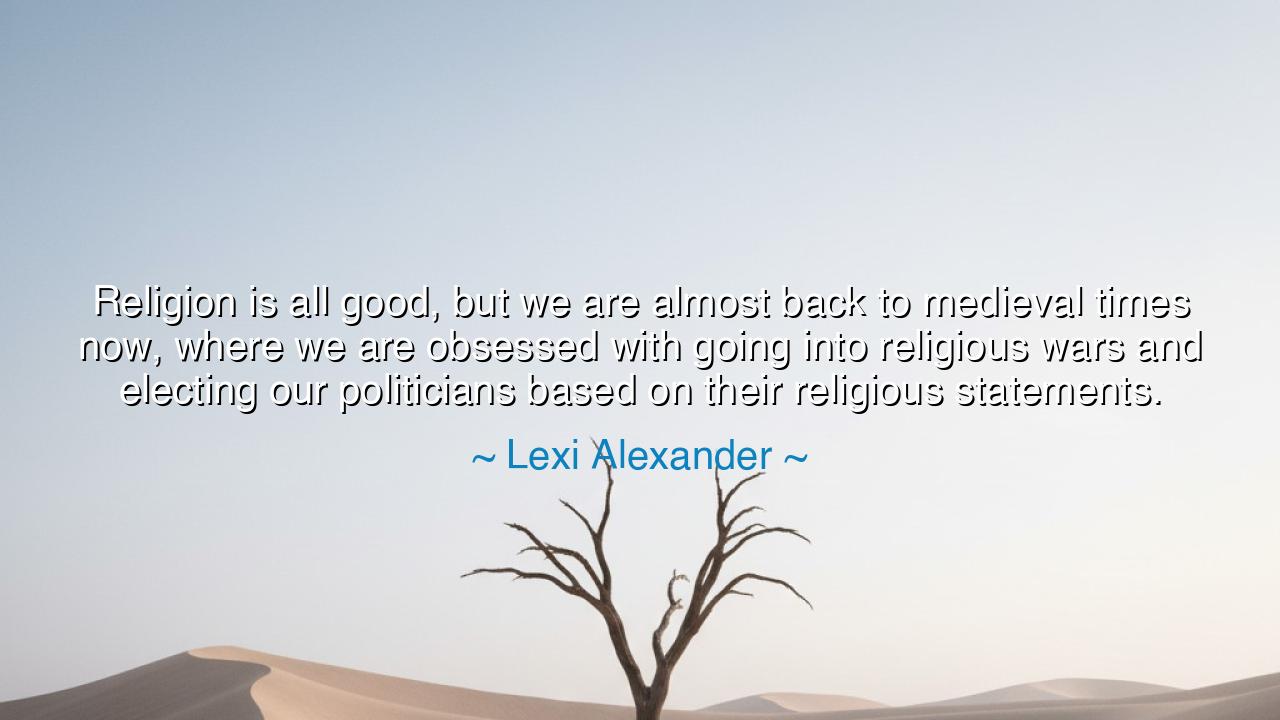
Religion is all good, but we are almost back to medieval times
Religion is all good, but we are almost back to medieval times now, where we are obsessed with going into religious wars and electing our politicians based on their religious statements.






“Religion is all good, but we are almost back to medieval times now, where we are obsessed with going into religious wars and electing our politicians based on their religious statements.” Thus spoke Lexi Alexander, a voice of conscience from the modern world—a filmmaker and truth-teller who saw in her time a shadow from the past returning. In these words she warns that what was once meant to unite the human spirit under love and compassion has too often become a weapon in the hands of fear and pride. Religion is good, she says—not as condemnation, but as remembrance of its pure purpose. Yet she sees the danger of man’s old folly rising again: the confusion of faith with power, the merging of divine truth with human ambition. Her words ring like the tolling of a bell through the centuries—a warning that though time moves forward, the heart of man too easily circles back into darkness.
To understand her warning, we must remember the medieval age, when faith and sword were bound together in terrible harmony. In those days, men marched beneath banners of heaven, shedding blood for the sake of their gods. The Crusades, born in zeal and cloaked in righteousness, turned the Holy Land into a graveyard of faith. The Inquisition hunted thought itself, seeking purity through pain. It was a time when religion ceased to heal and began to harm—when the sacred flame meant to warm mankind became a fire that burned him instead. Lexi Alexander’s lament is that we, in our modern pride, have not escaped that ancient circle. We wage wars in the name of belief, and we measure our leaders not by their wisdom or mercy, but by the loudness of their piety.
Religion, at its heart, is light—a path that leads humanity toward goodness, compassion, and unity. Every great faith, in its truest form, teaches love, humility, and peace. Yet when men turn religion into a tool for political conquest or tribal division, it ceases to be holy. The moment faith becomes a badge of superiority, it loses its essence. As Alexander reminds us, this transformation does not happen overnight. It begins with small acts of fear—when people begin to suspect those who worship differently, when leaders discover that invoking God brings them power, when the sacred becomes currency in the marketplace of ambition. Thus, step by step, the human race returns to its old chains, calling it progress even as it forgets the lessons of history.
Consider the story of Galileo Galilei, the man who looked upon the stars and found truth there. In his time, to question the order of the heavens was to challenge the authority of both science and scripture. The Church, bound by fear of losing control, silenced him, believing they were defending the faith. Yet in truth, they were defending power, not God. Galileo’s persecution stands as a testament to the danger Alexander warns of: when faith becomes fused with rule, when religion serves the throne instead of truth, even the voice of wisdom is condemned as heresy. The tragedy of Galileo’s time is not confined to the past—it echoes still in every age where belief is wielded as a weapon instead of lived as a blessing.
The modern world, though armed with technology and knowledge, still carries the old diseases of the soul. Nations divide along lines of creed; wars are waged under banners of righteousness; politicians cloak ambition in religious language to stir hearts they do not truly serve. The same blindness that guided kings and popes to war now moves through the speeches of leaders and the slogans of campaigns. And while the weapons may have changed—from swords to drones, from pulpits to platforms—the spirit of division remains. Lexi Alexander sees this clearly, and in her words lies both sorrow and defiance: sorrow for the repeating of humanity’s mistakes, and defiance against the ignorance that allows it.
Yet her wisdom also carries hope, for by naming the danger, she calls forth the possibility of awakening. If we are “almost back to medieval times,” it means we still have the chance to turn away. It is not too late to remember what true faith means—to separate the eternal from the political, the spiritual from the manipulative. For faith, when pure, is not a flag to march behind—it is a flame to carry quietly in the heart. It demands not conquest, but compassion; not domination, but understanding. The divine is not strengthened by war, nor measured by votes—it lives in acts of kindness and the courage to love even those who believe differently.
So, my child of the restless age, take this teaching to heart: do not let the sacred be turned into a weapon. Question those who speak loudly of God but live without mercy. Seek the essence, not the show, of belief. Defend faith not by force, but by embodying its truth—through empathy, humility, and peace. And when you choose leaders, do not ask how loudly they pray, but how deeply they care. Remember, religion is good only when it gives birth to compassion; it is corrupted when it serves pride.
For this is the timeless lesson of Lexi Alexander’s warning: the divine was never meant to divide us, but to remind us that we are one. When faith is free from politics and law from fanaticism, when love triumphs over fear and humility over arrogance, then humanity will truly step out of the medieval darkness into the light it was always meant to walk in. Until then, let every heart guard the sacred flame of conscience—and let that light be our only religion.






AAdministratorAdministrator
Welcome, honored guests. Please leave a comment, we will respond soon